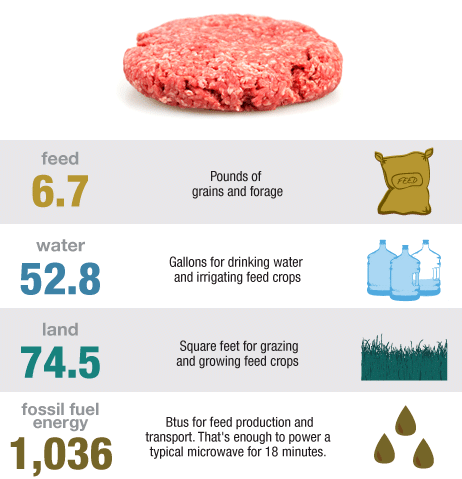Many Americans have given up the plastic or paper bag debate – realizing that neither option is a good choice for the environment – and have gone to reusable cloth market bags. Many have switched from incandescent to fluorescent light bulbs, and other energy-saving devices whenever they can. Most Americans are trying to recycle as much as possible. We know these are small changes, but they’re not insignificant when large numbers of us make them.
Another relatively small change that can have a huge impact if we act on it collectively is Meatless Monday. Meatless Monday is an initiative of The Monday Campaigns Inc. (whose tag line is “The day all health breaks loose.”). This international campaign encourages people not to eat meat on Mondays to improve their health and the health of the planet.
The environmental impact of a diet rich in beef and other meat is staggering. To put the energy-using demand of meat production into easy-to-understand terms, Gidon Eshel, a geophysicist at the Bard Center, and Pamela A. Martin, an assistant professor of geophysics at the University of Chicago, calculated that if Americans were to reduce meat consumption by just 20 percent it would be as if we all switched from a standard sedan like a Camry to the ultra-efficient Prius!
“We got hooked on grain-fed meat just as we got hooked on gas guzzling automobiles. Big cars `made sense’ only when oil was cheap; grain-fed meat `makes sense’ only because the true costs of producing it are not counted.” –Frances Moore Lappé, in Diet for a Small Planet
Given that the consumption of meat affects everything from the damage we do to our bodies and the planet to the suffering of people who are hungry and animals that are slaughtered, it makes absolutely no sense to continue to feed our voracious appetite for meat.
This graphic from National Public Radio’s website shows one estimate of what you can save by skipping just one quarter-pound burger:

Source: J.L. Capper, Journal of Animal Science, December, 2011.
In addition, you’ll decrease global warming caused by the release of CO2 from burning forests for cattle pastures, methane from farting cows, and nitrous oxide from petrochemical fertilizers used on feed crops for cattle (which, combined, generate more greenhouse gases than transportation, according to the United Nation’s Food and Agriculture Organization). You’ll also reduce water pollution caused by the cattle industry’s direct role in land erosion from deforestation and pollution from the use of pesticides and antibiotics.
Interestingly, two separate conferences in 1996 and 1997 used the very same number – 800 million – in quantifying both the problem of, and the solution to, world hunger!
The formal declaration adopted by consensus at the end of the World Food Summit in Rome from 13-17 November, 1996, began: “We express our keen concern at a situation where close to 800 million people throughout the world, in particular in the developing countries, suffer from chronic undernutrition.”
Nine months later, David Pimentel, professor of ecology in Cornell University’s College of Agriculture and Life Sciences, reported at the July 24-26 meeting of the Canadian Society of Animal Science in Montreal in1997: “If all the grain currently fed to livestock in the United States were consumed directly by people, the number of people who could be fed would be nearly 800 million.”
Is this just a coincidence?? Whether it is or not, it certainly validates this quote by Mahatma Gandhi:
“There is enough for everyone’s need but not enough for everyone’s greed.”
In the end, every small choice we make can have a big impact on the world around us. The following quote is sometimes also attributed to Gandhi, and other times to Mother Teresa. But no matter who said it, I think we all recognize it as a moral imperative.
“Live simply that others may simply live.”
It won’t kill any one of us to give up a burger or two. But it could kill a lot of us if we don’t.

